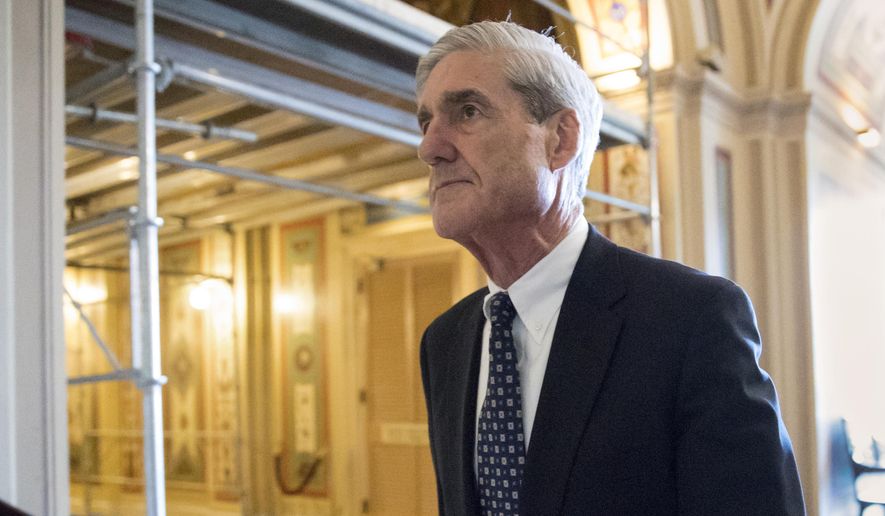WASHINGTON (AP) - From suggestions of “political synergy” and offers of business deals to contact with more than a dozen people in then-candidate Donald Trump’s orbit, Russian outreach to the Trump campaign has a familiar and alarming pattern to experts in the intelligence field.
The attempts by Russians to establish contact, which were laid out in the latest court filings by special counsel Robert Mueller, were persistent, apparently targeted and more frequent than would be expected during a typical presidential campaign, former officials said after reviewing the documents.
“This pattern is what the Russians do everywhere else in the world,” said Steven Hall, a former CIA official. “It’s standard intelligence tradecraft.”
Mueller has been investigating Russian interference in the 2016 presidential election for more than a year and has not revealed clear evidence of coordination between the Trump campaign and the Kremlin. Much of the investigation is still under wraps, but the portrait emerging from court filings and other sources is striking to intelligence professionals.
“It’s all vintage Russian intelligence behavior,” said Bruce Riedel, a former senior CIA officer and now a fellow at the Brookings Institution.
Trump, who has repeatedly lashed out at the probe, insisted in a tweet again this week that there was “NO COLLUSION” between his campaign and Russia. And it’s not unheard of for campaigns to be in contact at times with foreigners.
What’s “completely unusual” is the number of people involved, said Trevor Potter, who was general counsel for the late Sen. John McCain’s 2000 and 2008 presidential campaigns. Typically, any such communications would be routed through the foreign policy team and the general counsel alerted, he said.
Court filings and Associated Press reporting identified contacts between at least 14 people linked to the Trump campaign and Russian nationals. They include a Russian who reached out to former Trump lawyer Michael Cohen in 2015 and offered “political synergy” between Russia and the Republican campaign. A person familiar with the matter confirmed that person is a former Russian Olympic athlete named Dmitry Klokov.
Former intelligence officials say the pattern of Russian outreach emerging is similar to the early stage of a Russian intelligence operation.
Russian agents or third parties will approach people offering to help improve U.S.-Russian relations or offering a business deal before talking politics, said Hall, a retired CIA chief of Russian operations.
Russian contacts with the Trump campaign, which recent court filings from Mueller show, began within months of Trump announcing his candidacy in June, 2015.
A number of the Russians initiating the contact or proposing business deals were obscure figures with ties to the country’s military or powerful oligarchs.
On Trump’s side, Russians made contact with at least 14 individuals ranging from members of Trump’s family and senior members of his campaign to mid- and low-level associates.
The range of people in Trump’s orbit contacted by Russian individuals suggest the operation was in its early stages and was casting a “wide net,” Hall said.
“This is how Russian intelligence approaches start, in an amenable way,” Hall said, noting that the word “synergy” in the Mueller filing stood out to him in particular. Russian agents or third parties will approach people offering to help improve U.S.-Russian relations or offering a business deal before talking politics, he said.
Mark Galeotti, an expert on the Russian security services, said from what has been revealed so far he is doubtful the contacts were part of a Kremlin-directed operation.
“What I see are greedy and foolish people trying to do business in Russia and thinking it was still the wild 1990s where all you needed was a buck and a Western name to make money,” said Galeotti, who is now a fellow at the Institute of International Relations Prague. Galeotti said it is likely most of the Russians who reached out to the Trump campaign were “self-motivated.”
“It’s often that you will have a whole variety of different actors doing what they think the Kremlin would like them to do in the hope that they will be rewarded down the line,” he said.
Former U.S. Ambassador to Russia Michael McFaul said he was surprised by the relative obscurity of many of the Russians identified by the Mueller investigation.
“These are not the most prominent business people,” McFaul said. “This is not how Boeing, for example, does business in Russia. It seems rather amateurish.”
Former U.S. intelligence officials say the “amateurish” nature of the Russians who contacted the Trump campaign could be by design.
Russian intelligence agencies often use third parties to initiate contact.
“That’s why you’re seeing this weird cast of characters,” Hall said, explaining that individuals like Konstantin Kilimnik fit the profile of someone who would be used by a Russian intelligence agency as a low-level intermediary.
Mueller believes Kilimnik - who was born in Soviet Ukraine and served in the Soviet military before joining the International Republican Institute in Moscow as a translator - has ties to Russian intelligence. Kilimnik has denied this.
The emergence of Michael Cohen, Trump’s former personal lawyer and fixer, as central to Russian contact with the campaign also fits the mold of a Russian intelligence operation. Cohen’s large debt of over $14 million could be easily identified as a possible leverage point and by arranging the payment of hush money he demonstrated his willingness to undertake risky behavior.
“The goal is assess vulnerability and access,” Riedel said. “Cohen would be an obvious target on both counts.”




Please read our comment policy before commenting.